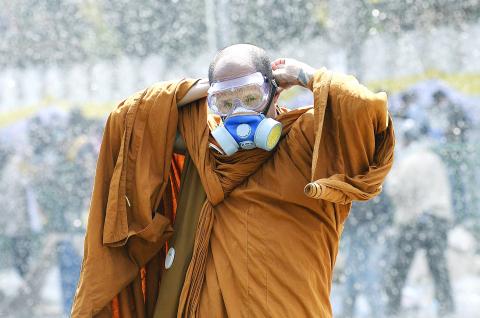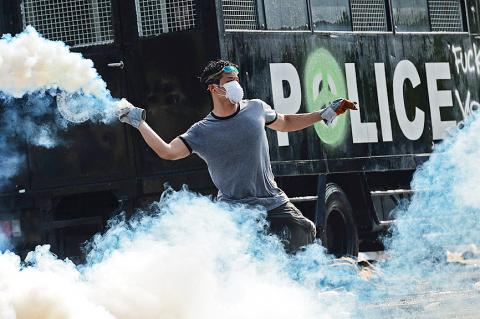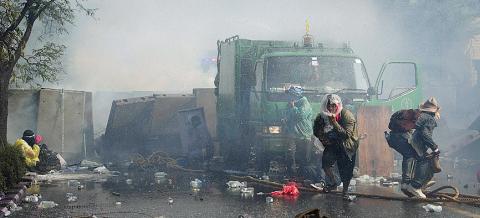Thai Prime Minister Yingluck Shinawatra yesterday said she is willing to do anything it takes to end violent protests against her government and restore peace, but cannot accept the opposition’s “unconstitutional” demand to hand power to an unelected council.
Yingluck’s comments, broadcast in a televised news conference, highlighted the unusual political deadlock Thailand finds itself in with no clear solution in sight even as violence on the streets continues to rise.
As Yingluck spoke from the heavily guarded national police headquarters, street battles between protesters and police that started over the weekend intensified.

Photo: Reuters
Protesters commandeered garbage trucks and bulldozers and tried to ram concrete barriers at Government House and other key offices. Police struggled to repel them by firing tear gas, water cannons and rubber bullets, as protesters shot back explosives from homemade rocket launchers.
The protests aimed at toppling Yingluck’s government have renewed fears of prolonged instability in one of Southeast Asia’s biggest economies and comes just ahead of the peak holiday tourist season.
At least three people were killed and more than 200 injured in the past three days of violence, which capped a week of massive street rallies that drew crowds of more than 100,000 at their peak.

Photo: AFP
“If there’s anything I can do to bring peace back to the Thai people I am happy to do it,” Yingluck said, striking a conciliatory, but firm tone.
“The government is more than willing to have talks, but I myself cannot see a way out of this problem that is within the law and in the constitution,” she said.
Protest leader Suthep Thaugsuban, who met with Yingluck on Sunday night, has said he will not be satisfied with Yingluck’s resignation or new elections.

Photo: AFP
Instead, he wants an unelected “people’s council” to pick a new prime minister who would replace Yingluck, even though she was elected with an overwhelming majority.
His demand has been criticized by many as undemocratic.
“I don’t know how we can proceed” with Suthep’s demand, Yingluck said in the brief 12-minute news conference. “We don’t know how to make it happen. Right now we don’t see any way to resolve the problem under the constitution.”
She cited Suthep’s repeated statements that he would not be satisfied even if she steps down to end the deadlock, and implied that she was willing to hold fresh elections if that helps.
“I am not against either resignation or dissolution of parliament if this solution will stop the protests,” Yingluck said. “The government is not trying to cling to power.”
The protesters, who are mostly middle-class Bangkok supporters of the opposition Democrat Party, accuse Yingluck of being a proxy for her brother, former Thai prime minister Thaksin Shinawatra. He was deposed in a 2006 military coup, but remains central to Thailand’s political crisis, and is a focal point for the protester’s hatred.
The protesters, who call themselves the People’s Democratic Reform Committee, say their goal is to uproot the political machine of Thaksin, who is accused of widespread corruption and abuse of power.
Yesterday’s violence took place around key institutions — the Government House, the parliament and Metropolitan Police Headquarters in the historic quarter of the capital.
The area has some of Bangkok’s main tourist attractions such as the Grand Palace, Wat Pho, the Bangkok zoo and the backpacker area of Khao San Road.
Most of Bangkok, a city of 10 million, has been unaffected.

The US government has signed defense cooperation agreements with Japan and the Philippines to boost the deterrence capabilities of countries in the first island chain, a report by the National Security Bureau (NSB) showed. The main countries on the first island chain include the two nations and Taiwan. The bureau is to present the report at a meeting of the legislature’s Foreign Affairs and National Defense Committee tomorrow. The US military has deployed Typhon missile systems to Japan’s Yamaguchi Prefecture and Zambales province in the Philippines during their joint military exercises. It has also installed NMESIS anti-ship systems in Japan’s Okinawa

TRAGEDY STRIKES TAIPEI: The suspect died after falling off a building after he threw smoke grenades into Taipei Main Station and went on a killing spree in Zhongshan A 27-year-old suspect allegedly threw smoke grenades in Taipei Main Station and then proceeded to Zhongshan MRT Station in a random killing spree that resulted in the death of the suspect and two other civilians, and seven injured, including one in critical condition, as of press time last night. The suspect, identified as a man surnamed Chang Wen (張文), allegedly began the attack at Taipei Main Station, the Taipei Fire Department said, adding that it received a report at 5:24pm that smoke grenades had been thrown in the station. One man in his 50s was rushed to hospital after a cardiac arrest

‘WIN-WIN’: The Philippines, and central and eastern European countries are important potential drone cooperation partners, Minister of Foreign Affairs Lin Chia-lung said Minister of Foreign Affairs Lin Chia-lung (林佳龍) in an interview published yesterday confirmed that there are joint ventures between Taiwan and Poland in the drone industry. Lin made the remark in an exclusive interview with the Chinese-language Liberty Times (the Taipei Times’ sister paper). The government-backed Taiwan Excellence Drone International Business Opportunities Alliance and the Polish Chamber of Unmanned Systems on Wednesday last week signed a memorandum of understanding in Poland to develop a “non-China” supply chain for drones and work together on key technologies. Asked if Taiwan prioritized Poland among central and eastern European countries in drone collaboration, Lin

ON ALERT: Taiwan’s partners would issue warnings if China attempted to use Interpol to target Taiwanese, and the global body has mechanisms to prevent it, an official said China has stationed two to four people specializing in Taiwan affairs at its embassies in several democratic countries to monitor and harass Taiwanese, actions that the host nations would not tolerate, National Security Bureau (NSB) Director-General Tsai Ming-yen (蔡明彥) said yesterday. Tsai made the comments at a meeting of the legislature’s Foreign Affairs and National Defense Committee, which asked him and Minister of National Defense Wellington Koo (顧立雄) to report on potential conflicts in the Taiwan Strait and military preparedness. Democratic Progressive Party (DPP) Legislator Michelle Lin (林楚茵) expressed concern that Beijing has posted personnel from China’s Taiwan Affairs Office to its